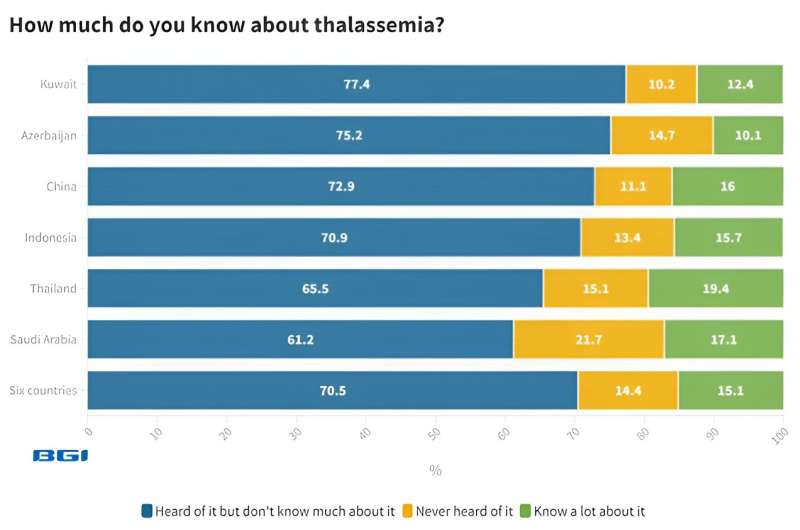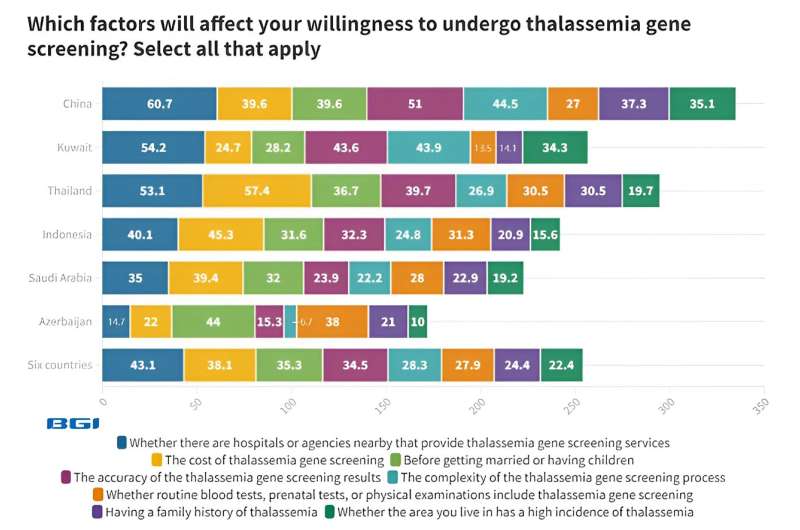This article has been reviewed according to Science X's editorial process and policies. Editors have highlighted the following attributes while ensuring the content's credibility:
fact-checked
proofread
Q&A: Awareness, accessibility, and affordability are crucial for the early detection of thalassemia

This article includes an interview with Dr. Androulla Eleftheriou, Executive Director at TIF, and Dr. Zhiyu Peng, Deputy GM at BGI Genomics, Head of the World Hemoglobinopathy Foundation
Thalassemia, a hereditary hemoglobinopathy, occurs in 4.4 out of every 10,000 live births and is prevalent in Mediterranean coastal areas, Africa, the Middle East, Southeast Asia, and southern China.
Screening and antenatal diagnosis reduced the frequency of β-thalassemia in many Mediterranean countries. Focusing on other regions with high thalassemia prevalence, BGI Genomics has launched the Global 2023 State of Thalassemia Awareness Report, covering 1,847 women from Azerbaijan, China, Indonesia, Kuwait, Saudi Arabia, and Thailand, to assess the level of knowledge and attitudes related to the associated health risks, thalassemia carrier screening, and genetic counseling for carriers.
Dr. Androulla Eleftheriou, Executive Director at Thalassaemia International Federation (TIF), Dr. Zhiyu Peng, Deputy GM at BGI Genomics and Head of the World Hemoglobinopathy Foundation, shared their views on this report's findings to offer greater insight to improve thalassemia awareness.
After reading this report's key findings, what are the top findings that surprised your team?
Dr. Eleftheriou: This report offers insightful information on the degree of public knowledge and awareness of thalassemia in various affected countries.
Surprisingly, a substantial number of surveyed individuals displayed a suboptimal understanding of the disease, which could impede effective prevention and control efforts. The report's findings correspond with TIF's Global Thalassemia Review 2022, highlighting the necessity to strengthen community awareness about thalassemia and its impact.
Dr. Peng: Around 70 percent of respondents from these countries with high thalassemia prevalence indicate they do not know much about this disease. There's room for national thalassemia awareness programs to start earlier and remind people at milestones.
For example, awareness programs could start in middle school and remind both men and women at milestones such as marriage, preparation for pregnancy, and birth. To ensure people know about the 'why' and 'how' of thalassemia screening, these programs should also cover carrier screening methods such as routine blood tests, hemoglobin electrophoresis, and genetic testing.
In your view, how can we use this report's insights to strengthen preventative thalassemia measures?
Dr. Eleftheriou: Awareness is crucial for prevention, early detection, targeted therapy, and effective treatment.

Understanding a disease and its symptoms encourages key preventative measures, such as screenings and regular check-ups. Identifying knowledge gaps contributes to tailoring hemoglobinopathy prevention strategies and control initiatives to suit each country's social, economic, and cultural characteristics.
Dr. Peng: Enhancing awareness, accessibility, and affordability are critical first steps in thalassemia control programs. Hospitals or agencies nearby that provide screening services (43.1 percent) and the cost of screening services (38.1 percent) are the top factors affecting the willingness to undergo thalassemia screening.
In Jiangxi, a Chinese province with a population of around 45 million, genetic testing is recommended for screening thalassemia carriers, further enhancing accessibility and reducing costs.
Please briefly introduce your organization and some of your team's recent initiatives to enhance thalassemia awareness in surveyed countries, e.g., Azerbaijan, China, Indonesia, Kuwait, Saudi Arabia, and Thailand.
Dr. Eleftheriou: The TIF is a non-profit, non-governmental umbrella organization dedicated to improving the lives of patients with thalassemia and hemoglobin disorders globally.
Collaborating with patient organizations, medical professionals, and international, regional, and national health authorities, TIF supports the development of new National Control Programmes and reinforces existing ones for the prevention and management of hemoglobinopathies worldwide.
TIF has member associations in all the countries covered in this report (Azerbaijan, China, Indonesia, Kuwait, Saudi Arabia, and Thailand). It continues strengthening its efforts and programs to safeguard patients' rights and improve their care and benefits.
Dr. Peng: We have ongoing projects in most countries covered in this study, but we will cite examples from Azerbaijan and China. Azerbaijan is one of the countries with the highest prevalence rate of thalassemia.
Recognizing these challenges, the Azerbaijan Thalassemia Center and BGI Genomics sealed a Collaboration Agreement in September 2022 to improve thalassemia screening through genetic technology. To enhance awareness of local medical professionals, we organized a satellite symposium at the Azerbaijan Laboratory Medicine Congress & Lab Expo in May 2023.



















